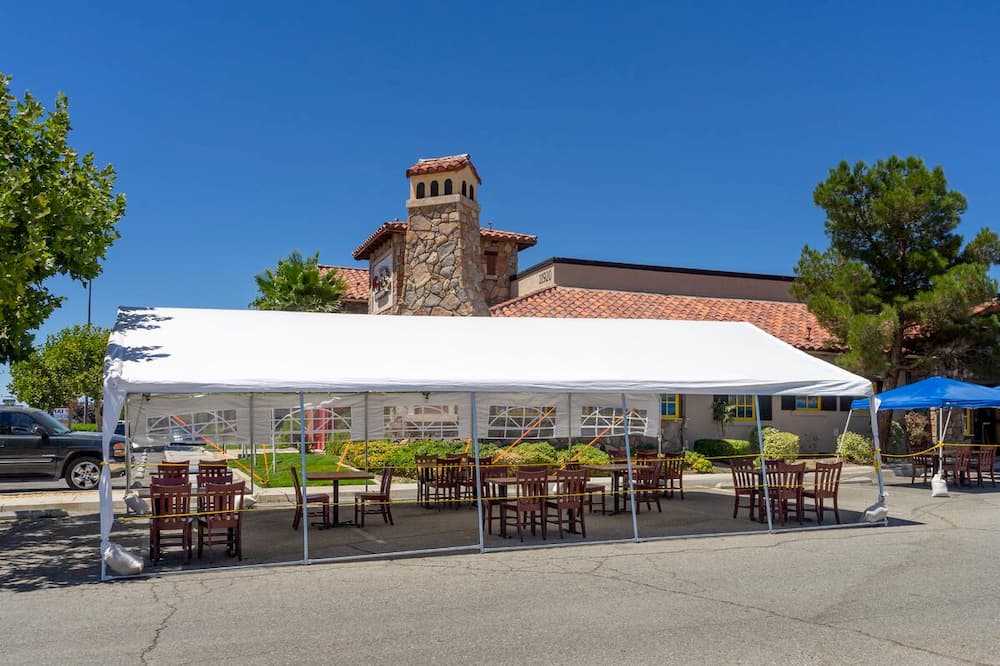How to Move Your Business Outdoors to Meet COVID Guidelines
Nearly half a year into the COVID-19 pandemic, small business owners are still adjusting and doing their best to come up with ways to operate in this new normal. That means everything from adding curbside delivery to opening online storefronts to meet consumers where they are.
With summer closing its loop and cooler temperatures upon us, many small business owners are considering taking their business outside. If you’re selling a good(s) or food, why not pop up shop right outside of your brick and mortar? For one, the open air and added spaciousness is better during the age of COVID-19. Additionally, the shift outside can assuage consumers’ fears of crowded stores.
Yet, while operating outside presents a new opportunity to continue to run a business, before you post the “Now Open” signs, it’s important to ensure you’re meeting COVID-19 guidelines.
Below, we’ll show you how.
What to Know About COVID-19 Guidelines For Moving Businesses Outdoors
The Centers for Disease Control and Prevention (CDC) is explicit in its instructions to business owners on how to prevent and avoid COVID-19 transmission, maintain healthy operations, and create a healthy workplace. Here’s what those guidelines look like in an outdoor space, and some specific examples for restaurants, beauty salons, and workout studios.
Follow the Rules
You can’t ring up your first sale until you’ve done everything possible to ensure the health and safety of staff and customers.
Here’s what the CDC suggests:
- Set up sanitizer stations – The CDC encourages business owners to “Ideally, place touchless hand sanitizer stations in multiple locations to encourage hand hygiene.”
- Establish practices for social distancing – Just as indoor spaces are subject to social distancing regulations, so too are outdoor spaces. The CDC recommends the use of signs and tape markings to give customers and staff visual cues of how far apart they should stand. That means a minimum of 6 feet distance.
- Routine cleaning – A cleaning plan to reduce the risk of COVID-19 must be introduced and maintained in order to ensure the health and safety of staff and customers. For help, the CDC has curated a list of EPA-approved products and disinfectants business owners should use.
- Deploy contactless payment – To discourage unnecessary touching and improve social distancing, the CDC suggests moving the electronic payment reader away from the cashier. If at all possible, businesses should also employ contactless payment systems.
- Train employees on COVID-19 policies – Ensure health and safety protocols are implemented properly. That includes the following: “General hygiene, what to do if sick, cleaning and disinfection, cloth face covers, social distancing, use of PPE, safe work practices, and stress management.”
- Adjust sick leave – Employers need to follow public health guidance as it applies to sick leave. The CDC suggests creating flexible sick leave that allows employees to take care of themselves and family members if they become ill. If a business doesn’t have sick leave, it’s recommended that they institute an emergency sick leave policy.
- Minimize large employee gatherings – Rather than having a pre-service gathering before opening a restaurant, the CDC suggests informing staff in other ways, either in socially distant small groups or notifying them digitally.
- Educate employees – Whether operating inside or out, employees need to know what to do if they fall ill, how to inform their employer, and what steps to take to protect others from transmission.
Do You Have a Permit?
Ask any property attorney and they’ll tell you that you better check your lease before you start trying to run your business outside. Business permits and regulations vary by city, but here are some general guidelines to consider:
Read the Fine Print
According to Holland & Knight law firm, “Even a ground lease (which typically allows for use of certain areas outside of the building pad), typically has restrictions on use of the exterior of the leased premises.” Review your lease to ensure you’re within your legal limits to operate.
Don’t Rule Out Negotiations
The saying goes, “If at first you don’t succeed, try, try again.” And that just might work in the case of a lease that doesn’t allow for exterior space usage. Again, Holland & Knight suggests tenants approach their landlords to see if they can amend a lease to allow for outside use. But keep in mind, this will likely include “analysis of liability, indemnification and insurance issues.”
Check With the City
Sidewalks may fall under the jurisdiction of local municipalities, as well as certain zoning restrictions. That may not be a problem for a boutique store, but if you’re a restaurant wanting to serve alcohol outdoors, open container laws may interrupt that service. Check permitting and licensing requirements before starting operations.
Ask an Attorney
When in doubt on any of the legalities of operating a business outside, seek assistance from a practicing real estate attorney well versed in the rules and regulations of your community.
How Some Businesses are Making It Work Outside
Even with the challenges presented with moving a business to the great outdoors, many businesses across the country are making it work. Here are a few examples:
Hair Salons
In Charlottesville, Virginia, one salon has taken pandemic primping into its own hands. In May, HairSmith and CO founder Megan Smith-Watson transformed her salon’s patio into a haircut space. “Hairdressers pivot all the time, it’s just in our DNA, it’s what we do. We’ve always done things in an innovative way,” Smith-Watson told NBC29.
To make it work, Smith-Watson and her team have taken extra precautions to ensure clients’ safety and peace of mind. That includes a consent form that all clients must sign before coming in for a cut. The client must verify that they “understand that COVID-19 has a long incubation period during which carriers of the virus may not show symptoms and still be highly contagious” and “I confirm that I have not been around anyone with these symptoms in the past 14 days” in addition to other key items.
The idea is to limit a business’s liability should a customer become ill following a treatment. However, Newsday reports that whether that waiver holds up in court depends a lot on the case.
Restaurants
Small restaurant owners are at an advantage if they already have an established patio to serve outdoors. Even still, the list of precautions restaurants must take, according to the CDC, are extraneous. They should be closely adhered to. They include everything from how to sanitize tables to how to keep employees in kitchens safely distanced.
In order to encourage the reopening of the restaurant industry which has been devastated by the pandemic, some cities like Tampa, Florida, instituted a temporary use of sidewalks for restaurant seating. The initiative came with detailed regulations per the Governor’s executive order. Restaurants were restricted to 25% capacity with six feet between tables. Although strongly encouraged by the CDC, masks were not required.
In other cities, like Seattle, restaurants have had to apply for an “outdoor cafe permit” or attempt to get a “street closure grant” according to Eater.
Every restaurant should review what steps their city is taking to make outdoor access available.
Workout Studios
Taking group fitness classes outdoors is arguably intuitive. That said, many gyms across the US are taking this very initiative. But social distancing and maintaining health and safety precautions still must play a role in hosting a Zumba or Barre class outside.
One fitness center that’s found a solution, according to CNBC, is Firehouse Fitness Studio in Philadelphia. Using its rooftop as a studio, Firehouse hosts mixed sculpting classes under the sky. Owner Dana Auriemma worked with her landlord to ensure social distancing by limiting class size and maintaining six-foot social distancing regulations.
Clearly informing participants of regulations beforehand is critical to success and ensuring state approval to reopen. Some gyms have been lambasted for failing to follow mandatory directives.
Spread the Word
Once you’re ready to reopen outside, it’s time to let people know. That means getting the word out. But first, according to the US Chamber of Commerce, to maintain customer trust and retain key market stability, a small business should craft a consistent message that can be used across multiple channels.
Here’s the best way to spread the word and reassure customers that you’re in compliance with COVID-19 guidelines.
Edit Your Website
Update your website with the relevant info regarding hours of operation and location as well as how you’ve changed your policies to meet COVID-19 health best practices.
Send e-Newsletter
Using your subscriber list of past customers, send out an email notifying clients of your shift to outside operations. Then give them specifics about how they can visit safely.
Social Media Shout Out
Social media accounts provide a great way to reach loyal clients. Post a photo on Instagram of your new outdoor space and its hand sanitizer station, tease a reopening on Twitter, or ask for feedback on Facebook on how you can make customers feel safe.
Alert the Media
You know what people in challenging times crave? A feel good, comeback story. Send a press release or succinct email to members of the local media to encourage a story on your business. You want to highlight your successful outside operations and how you’re following rules and regulations to the letter.
Join Nextdoor
Get the word out to neighbors and friends by joining Nextdoor. The hyperlocal neighborhood hub is full of verified neighbors who live and work near your business. Members use Nextdoor to share reviews, provide referrals, and generally discuss topics important to their community. Small business owners can spread the word about how they’re meeting COVID-19 precautions head on.
Nextdoor Opens Doors
According to a Groupon study in May reported in NYPost, 75% of Americans said they plan to make a bigger effort to support small businesses. And Nextdoor is where they’ll find them. Internal surveys show that 88% of Nextdoor members shop at a local business once a week or more.
Additionally, 75% of members are willing to pay more for something from a local business over a big-box retailer. Want to meet these fantastic locals? Then it’s time to join the neighborhood hub.
To get started with Nextdoor’s tools for small businesses, just:
- Create your free Business Page
- Customize it to share your own mission, motto, photos, and story
- Run promotions directly on Nextdoor with Local Deals
- Engage with free Business Posts to connect with customers and business owners alike
As part of the Nextdoor community, small businesses have immediate access to verified members. That means no anonymous or fake names. And there’s no need to try to recruit a following. When you join, you get instant distribution to everyone in your neighborhood.
--
Additional sources:
Centers for Disease Control & Prevention. Interim Guidance for Businesses and Employers Responding to Coronavirus Disease 2019 (COVID-19). www.cdc.gov/coronavirus/2019-ncov/community/guidance-business-response.html
Holland & Knight. Before Expanding Their Operations Outdoors, Retailers Should Explore a Few Key Factors. www.hklaw.com/en/insights/publications/2020/06/before-expanding-their-operations-outdoors
Newsday. Salon customers signing legal waivers before the cut and color. https://www.newsday.com/long-island/waiver-liability-salons-coronavirus-1.46086020
NBC29.com. Charlottesville hair salon tweaking its business model to make customers feel safe. https://www.nbc29.com/2020/08/18/charlottesville-hair-salon-tweaking-its-business-model-make-customers-feel-safe/
US Chamber. Combating Coronavirus. www.uschamber.com
NY Post. How Americans are supporting small businesses during the coronavirus crisis. https://nypost.com/2020/05/19/the-top-ways-americans-are-supporting-small-businesses-during-the-covid-19-crisis/
Claim your free Business Page to get started on Nextdoor. For resources on how to use Nextdoor to stay connected with your local customers, pertinent news affecting businesses, and more, follow us at @nextdoorbusiness on Facebook.








